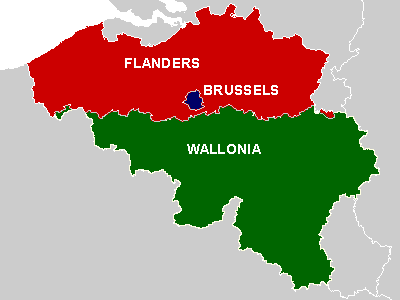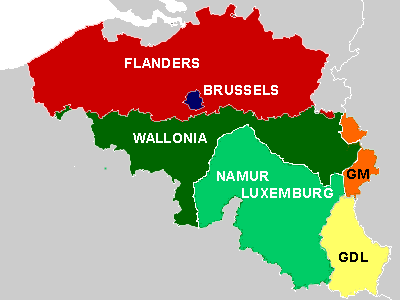
Belgium is an artificial state of 10.5 million inhabitants. The country was put together in 1830-31 by the international powers as a political compromise and an experiment in building one state out of two nationalities. It consists of 6 million Dutch-speakers in Flanders, its northern half bordering the Netherlands, 3 million French-speakers in Wallonia, its southern half bordering France, and 1 million people in its capital Brussels, which is also the capital of the European Union. Throughout its entire history Brussels was a Dutch-speaking town, until the middle of the last century, when the deliberate “frenchification” policy of the Belgian authorities succeeded in turning it into a predominantly French-speaking city.
Many doubt whether, without Brussels, Wallonia will be viable as an independent state. Uniting Brussels and Wallonia is, however, impossible because this would require that Flanders relinquishes part of its territory to Wallonia in order to create a “corridor” linking Brussels to the rest of French-speaking Belgium.
Until 1830 Belgium belonged to the Netherlands. Historically contemporary Belgium (the name of the country is derived from Belgica, which is Latin for the Netherlands) is made up of the Southern Netherlands and of the Prince-Bishopric of Liege. Liege never was a part of the Netherlands and greatly resented being incorporated into it. Liege, the largest city in Wallonia, would have preferred to join France. The Belgian revolution of 1830 was the work of French republican and napoleonist exiles living in Brussels, and rebels from Liege. Together they succeeded in driving the Dutch army from Wallonia and subjugating Flanders by force. Though the revolutionaries wanted the annexation of Belgium by France, this was vetoed by Britain and the country became an independent state run by an establishment of French immigrants and Liegeois. They eradicated the decentralised Netherlandish political traditions of the country and ran Belgium as a centralised copy of France. If Belgium had been established as a second Netherlandish state, it could probably have become a viable entity. As it was, however, the project to turn it into a second France was doomed from the beginning.

While the Flemings consider themselves to be a nation, the Walloons do not. Some of them feel French, but others do not. This explains why a breaking up of Belgium would likely lead to a fragmentation of Wallonia. After the First World War, Belgium annexed a number of German municipalities (GM) where, despite a frenchification policy, German is still the dominant language. These municipalities will neither want to join an independent Wallonia nor become a part of France. They could either return to Germany or opt for annexation by the Grand Duchy of Luxemburg (GDL).
Luxemburg, moreover, is a problem of its own. Historically Luxemburg , like Flanders and unlike Liege, was part of the Southern Netherlands. When Belgium was established in 1831, many Luxemburgians preferred to remain loyal to King William of the Netherlands. By way of compromise Luxemburg was split up in 1839. The eastern part of Luxemburg, the present GDL, became an independent state with the Dutch King as its monarch. This personal union lasted until 1890 when, upon extinction of the male line of the House of Orange-Nassau, the Netherlands passed to the female line of that house and Luxemburg to the House of Nassau-Weilburg. The western part of Luxemburg, however, was given to Belgium and is currently the Belgian province of Luxemburg. Many (Belgian or West) Luxemburgians would want to reunite with the GDL.
The same may also be true for the inhabitants of the Belgian province of Namur. Like Luxemburg, Namur is a rural province. Unlike the rest of Wallonia, the provinces of Namur and Luxemburg are conservative and Catholic. Both provinces belong to the diocese of Namur. If Namur and Luxemburg secede from Wallonia to join the GDL – which would be likely – this would leave Wallonia proper with only the provinces of Hainaut and Liege, two strongholds of the Parti Socialiste – the party which is responsible for the current disastrous economic condition of Wallonia (and Belgium).
Although the majority of its people speak Dutch, Belgium has throughout its history been dominated by a French-speaking establishment. When in the early 20th century the country gradually began to democratise, this establishment feared that the Flemings would become the rulers of the state. Hence, Belgium was federalised giving Wallonia a constitutionally guaranteed veto over all major decisions and a guaranteed share of half the seats in government and major administrations. The conservative, free-market oriented Flemings have been complaining for decades that they are forced to subsidize the Socialist south, while no improvement of the economic situation of the Walloons has been visible. On the contrary, Wallonia has become one of the most corrupt regions in Europe with hardly any economic growth.
Every attempt to liberalise the Belgian economy and to reform the generous Belgian welfare system has been vetoed by the Walloon Socialists. This has led to increasing Flemish frustration, resulting in the growth of the Flemish-secessionist movement. Flanders is no longer prepared to finance the ever increasing amount of Flemish subsidies which are flowing to the south each year (4 billion euros in 1990; 10 billion euros at present). It wants to cut loose its ties with Wallonia. It simply has no other option if it does not want to go down with Wallonia.
Though Wallonia has 33% of Belgium’s population, it has 46% of its unemployed and it accounts for only 24% of Belgian GDP and 13% of its exports. 20% of the Walloons are unemployed and 40% work for the government. The only regions of Wallonia where there is an entrepreneurial spirit are the regions bordering Flanders just south of Brussels, the provinces of Namur and Luxemburg and the German municipalities (GM).
If the Flemings secede from Belgium the question what to do with Wallonia will cause the international community a bigger headache than what to do with Brussels. Brussels is not viable on its own either. Almost half its population are non-European Muslim immigrants – “eurabianisation” has already progressed considerably – and the Brussels region also receives large flows of Flemish subsidies. Flanders would be happy to let the European Union have Brussels, provided Europe finances Brussels and relieves Flanders of that burden. However, since Flanders for obvious historical reasons feels responsible for this erstwhile Flemish town, an independent Flemish state would be willing to incorporate Brussels within its territory, granting it a multilingual status and recognizing the linguistic rights of Brussels’ French-speakers.
Indeed, the international community can expect Flanders to bail out Brussels, but it cannot expect the Flemings to continue to finance Wallonia and to mortgage the future of their own children for it.

